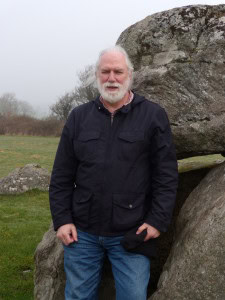AHA members are involved in all fields of history, with wide-ranging specializations, interests, and areas of employment. To recognize our talented and eclectic membership, AHA Today features a regular AHA Member Spotlight series.
John Phillip Lomax is a professor of history at Ohio Northern University. He lives in Ada, Ohio, and has been a member since 1985.
I received the BA in history from Nebraska Wesleyan University in 1974 and the MA in history/humanities from the University of Chicago in 1975. I completed my graduate training at the University of Kansas, where I received the MPhil in history in 1981 and the PhD in history in 1987.
Fields of interest: medieval Europe, legal history, church history
When did you first develop an interest in history?
In Mrs. Dolan’s sixth grade history class. She was the finest classroom teacher I have ever had: smart, inventive, engaging, respectful, and hands-on.
What projects are you working on currently?
- A study of the juridical force of the term status in the works of Joachim of Fiore
- A study of the contractual nature of the crusading oath
- An inquiry into faith status of Emperor Frederick II Hohenstaufen from both the imperial and papal perspectives
Have your interests changed since graduation? If so, how?
No. I was and I remain guided by the perception that, in the Middle Ages, nearly everyone agreed that a legal argument was the best defense for doing or not doing anything. Thus I continue to analyze medieval texts from the juridical perspective to unpack how persons in the 12th- and 13th-century Europe explained, promoted, and defended their ideas and actions.
Is there an article, book, movie, blog etc. that you could recommend to fellow AHA members?
Brian Tierney’s book, Religion, Law and the Growth of Constitutional Thought, 1150-1650, which contains more useful (and superbly documented) insights about the origins and development of Western political life than any one book I have read. It fits the definition of mature scholarship perfectly: readable, compact, and important. On a lighter note, the film Ladyhawke is a fine modern representation of the medieval worldview. Notwithstanding its dreadful 1980s soundtrack, the story takes itself and its material seriously. Not a trace of postmodern irony, which I like and respect in a story set in the Middle Ages.
What do you value most about the history profession?
That it provides a really effective set of tools to evaluate the truth claims that people—myself included—make about the past or, for that matter, anything. It has instilled in me the question, “How do you (or I) know that?”
Why did you join the AHA?
I remain a member of the AHA because I like to keep up with historians and with the history profession. Indeed, I delight in finding out what my colleagues are doing and saying. But I joined the AHA to get the job listings.
Do you have a favorite AHA annual meeting anecdote you would like to share?
I was looking for a job at the annual meeting in Chicago in 1987. My old professor Karl Morrison introduced me to his friend John Hope Franklin, which left me a bedazzled. Not 10 minutes later another old professor, Jules Kirshner, asked me, “Are you still around?” That brought me back to earth!
Other than history, what are you passionate about?
My wife and daughters, gardening, and the landscape of southeastern Nebraska.
Any final thoughts?
First, I value reading, writing, talking, and thinking things through. I exercise and profess these operations daily. Second, history is about as much fun as the law allows.
This post first appeared on AHA Today.
This work is licensed under a Creative Commons Attribution-NonCommercial-NoDerivatives 4.0 International License. Attribution must provide author name, article title, Perspectives on History, date of publication, and a link to this page. This license applies only to the article, not to text or images used here by permission.




